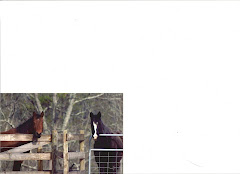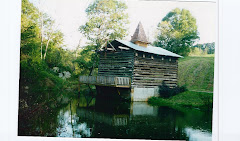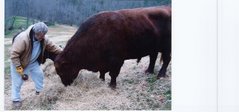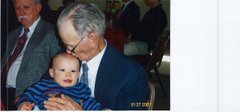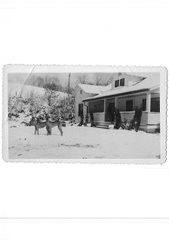The first school I remember was in Clyattville, the little village outside Valdosta where we lived. The paper mill where daddy worked was the one of largest employers in the county. A crossroad with a small grocery store/gas station on one side and the railroad tracks on the other, the school and churches were the center of community life. Two churches, the Methodist and the Baptist were “in town” with the Church of Christ and the Church of God out in the country.
The school sat next to a bamboo grove that was part of our playground. Years of children running through the tall canes had worn a tunnel path through the heart of the green cathedral and it was a favorite place to hide out. Tall pines offered shade and there was plenty of room to run and play without too much supervision. Our full service school offered first through the twelfth grade education.
High school students had their outdoor time separate from the elementary children. At that time there was no distinction between elementary and middle school. You were in elementary school until you entered high school in the ninth grade. Sometimes our breaks would overlap and we would study the boys and girls, watching them hold hands as they walked, seeing the boys carrying the girls’ books, standing by the basketball goal as the guys fooled around with the basketball. They were our brothers and sisters, cousins and neighbors so we all knew who we belonged to and our world was contained in that web of relationship.
Parents and teachers were in close communication at the grocery store, church or filling up the car with gas. If you were called into the principal’s office, even in the era before cell phones, somehow your parents knew before you got home. Many of the teachers and families had lived in Clyattville all their lives so communication was swift throughout the community via the relationship internet.
Most of the large community wide social events were held at the school. Donkey basketball, barbeque and fish fry fund raisers, piano recitals, dances, graduation ceremonies, Halloween carnivals with cake walks and games were held in the gym, the largest building in our little town. The school was an expansive extension of the families who sent their children there for an education. Everyday large yellow school buses rolled up to the side of the playground and children of all ages stepped out and headed towards class. There were very few high school children who drove a car, only those who left school to go to work.
My big yellow bus, driven by Mr. Woods, was my daily transportation. High schoolers sat usually in the back, girls sometimes with boys, lots of teasing and laughter with a line of acceptable behavior we did not cross. Our parents all knew Mr. Woods and we did not want him reporting us.
And then came “Consolidation”. Bitterly fought by little communities like ours, the powers that be decided to subscribe to the new notion that larger was better... more kinds of classes, better buildings, more opportunity for learning. So our little school along with other little community schools in the county, sent their high school students to the big new county school by the airport. Only the elementary schools remained local.
It was in many ways a death for the community. The separation meant longer bus rides for the high school students and many of them wrangled cars so they could drive themselves. The big yellow buses no longer carried us all together to school. This change took the small community focus away. There were no more basketball games in our gym nor were there dances and donkey basketball games. The high school had provided a place and a reason for us to gather at the students social events as well as events that included the community.
I have been reading a Wendell Berry book, Life Is A Miracle. The way he uses words reminds me of another of my faith heroes, Carlyle Marney. They love ideas expressed in precise words that say exactly what they intend to express and they love the sound and feel and look of words. Their work is rich and layered with meaning so that I must read it at least twice with a time space in between so that I do not miss anything. It also helps that I agree with everything he has written in this book.
The second chapter titled Propriety is a humdinger. He uses an old fashioned word containing the elements of context, influence and locality to tackle the institutions and disciplines that seek global answers for fame and fortune. He sees specialization in any field, the narrowing of the field of expertise, as dangerous when deprived of propriety. Now we have huge for profit hospitals with all the scientific bells and whistles but very few hospitals owned and run by people of faith. Large consolidated school systems with computer labs and multi-track learning systems without the connections of the neighborhood school are the norm. Most parent teacher communication is not within the context of relationship in a community but is between two adults who barely know each other.
Corporations, centers of learning, hospitals, churches now have similar values, aims and methods. The product that can be measured, exported and is profitable is the new bottom line. How many children pass the end of grade tests determines the success of the teacher and the school not how many children actually learn how to learn. The profit margin in a hospital is more important than nurses who are not run ragged by short staffing unable to practice their calling of caring for the sick. Large churches with multiple programs designed to meet your every need become faith ghettos cocooning their members in beautiful buildings that look like large country clubs.
Propriety, the quality that says what is good for us all is more important than what is good for a few, has flown out the window along with the Golden Rule. Bigger is better. More is not enough. Our knowledge and our ability to manipulate our surroundings has led us down the garden path of invincibility. We know, we are specialists, therefore we do not have to look at the big picture or pay attention to the whole body.
It was an interesting paradox lived out in Clyattville. Our little school did not provide many of the “opportunities” the large consolidated high school had. We didn’t have a football team just a basketball team coached by one of our preachers in town. We had no gifted and talented program just teachers who gave the smarter children extra reading and work. We had no guidance counselors to tend to the troubles in the Terrell family. These things were nice to have but the price we paid for them was high. In the loss of our locality, our context, our influence within our small community faded. No longer did we meet up with our teachers at the gas station or see them in church on Sunday. Our children were tended by strangers and the glue of relationship, the network that helped raise our children, was weakened and many children slipped through the cracks unnoticed.
Berry says the sin of specialization is isolation, acting as if what we do, who we are, what our abilities are, how we live in this world has nothing to do with our locality. We are global in outlook and have lost our wider vision at home. Saint Paul used the image of the body to remind us that the relationship between the parts produces a functioning whole without the elevation of one part over the other. The hand is not greater than the eye and the eye could not function without the brain nor could the stomach work without the mouth. We need each other. We need propriety as a guide to distinguish the gilt from the gold.
Lord, keep me focused on the whole as well as the particular. Save me from believing I have the answers. Help me be a good neighbor to people and my little place here on earth. And when I stray from the path of righteousness, Lord, guide me back home to your loving being before you set me free to wander again.
Friday, January 15, 2010
Thursday, January 14, 2010
Friendship...
Warren and Sue enclosed a little calendar in their Christmas letter, a calendar that was initiated in 1884 by Thomas Scattergood,(don’t you love the image in that name?), a Philadelphia Quaker. Like the Quakers, it is plain, with no illustrations, red and black ink, five by seven with a small hole at the top if you want to hang it. This Motto Calendar will rest on my old table desk next to my computer for this year to come. It is divided into months and each month has quotes and a motto on each page. One quote on the January page was about friendship. “A true friend knows your weaknesses but shows you your strengths; feels your fears but fortifies your faith; sees your anxieties but frees your spirit; recognizes your disabilities but emphasizes your possibilities.” William Arthur Ward (1921-1994) USA I am going to count my friendship blessings this month.
First friendship blessing...This year’s crop of Christmas cards was a joy and a pleasure. Pictures of children growing and grown, letters telling the Reader’s Digest Condensed version of lives lived in the year past, beautiful designs and words of faith. All have been saved so I can read and re-read them this month. They are visible signs of friendship, a treasure.
Second friendship blessing... Last night I sat at a table surrounded by women who know how to put my dishes away. They have all been in my kitchen enough to know where the silver goes, how to put up the glasses, where the pans are. A meeting of the Ladies Aid had been called for a mother in distress about a teen daughter who is acting out. We sat at the restaurant, chosen because it makes good Margaritas, and sang our songs of woe, toasted life, laughed a lot, ate and took pleasure in our company. I sat and looked at our group. Once we all belonged to the same church. Now we are Presbyterian, house church, coffee shop church, UCC, no church at all but the bonds formed long ago still hold. Mother to mother, we listened and heard stories of children running off the tracks. There wasn’t much we could do to change children’s behavior but we held each other tenderly last night. That helped us all. And, the margaritas were great. I had two so I know.
Third friendship blessing... my daughters and son. I have daughters and a son whose friendship I treasure. We are not of the same generation and I am their mother, not their contemporary, so this friendship has evolved and is still under development. I can remember clearly how it felt to be their age, raising small children, stretched to the max financially, emotionally, physically. Some days I despaired of ever being able to help my children grow into decent adults. Megan learned her first cuss word from me and used it freely at my parent’s house at the age of three. Alison’s fierce struggle to be her own person began at birth. My son, our third child, was a snuggle child, a lap sitter. And now they are grown up in ways I never imagined, wonderful adults who are making good lives for themselves. They come home for visits, call frequently, take a beach trip with us in the summertime. I delight in their presence in my life.
Fourth friendship blessing... friends through the years. We went to a friend’s wedding this month, a friend we have known for nearly forty years. We drove to the wedding with friends whom we have known for the same amount of time. We had dinner last Sunday night with a friend, my Sunday School teacher when I was a young mother, who is a wonderful example of how to make new friends and treasure old ones. When I look through the Christmas cards and letters, I see friends we have had for years and years. They have seen me through depression, craziness, joys, griefs, hard times and good times, partied with me, cried with me, loved me even when it was hard, put their feet under our table and shared many a meal. They are scattered across the world and periodically, they will show up for a visit. No matter how long we have been separated, we pick up where we left off. A long lasting friendship, like a marriage, is a gift of great value. And speaking of marriage, my friendship with Michael, my husband, has stretched us both in ways we could never have imagined when we took our vows. Those promises we made helped keep us together when times were tough and we are still being surprised by each other.
The motto for this month from my Motto Calendar is... “He is your friend who pushes you nearer to God.” Abraham Kuyper (1837-1920) The Netherlands. I am so grateful for all my friends, new and old, who have been pushing and will continue to push me towards God. Friendship, a heart treasure, a celebration of who I really am and all I could be, is a reminder gift from a God who yearns to share my life. I am blessed and I know it.
First friendship blessing...This year’s crop of Christmas cards was a joy and a pleasure. Pictures of children growing and grown, letters telling the Reader’s Digest Condensed version of lives lived in the year past, beautiful designs and words of faith. All have been saved so I can read and re-read them this month. They are visible signs of friendship, a treasure.
Second friendship blessing... Last night I sat at a table surrounded by women who know how to put my dishes away. They have all been in my kitchen enough to know where the silver goes, how to put up the glasses, where the pans are. A meeting of the Ladies Aid had been called for a mother in distress about a teen daughter who is acting out. We sat at the restaurant, chosen because it makes good Margaritas, and sang our songs of woe, toasted life, laughed a lot, ate and took pleasure in our company. I sat and looked at our group. Once we all belonged to the same church. Now we are Presbyterian, house church, coffee shop church, UCC, no church at all but the bonds formed long ago still hold. Mother to mother, we listened and heard stories of children running off the tracks. There wasn’t much we could do to change children’s behavior but we held each other tenderly last night. That helped us all. And, the margaritas were great. I had two so I know.
Third friendship blessing... my daughters and son. I have daughters and a son whose friendship I treasure. We are not of the same generation and I am their mother, not their contemporary, so this friendship has evolved and is still under development. I can remember clearly how it felt to be their age, raising small children, stretched to the max financially, emotionally, physically. Some days I despaired of ever being able to help my children grow into decent adults. Megan learned her first cuss word from me and used it freely at my parent’s house at the age of three. Alison’s fierce struggle to be her own person began at birth. My son, our third child, was a snuggle child, a lap sitter. And now they are grown up in ways I never imagined, wonderful adults who are making good lives for themselves. They come home for visits, call frequently, take a beach trip with us in the summertime. I delight in their presence in my life.
Fourth friendship blessing... friends through the years. We went to a friend’s wedding this month, a friend we have known for nearly forty years. We drove to the wedding with friends whom we have known for the same amount of time. We had dinner last Sunday night with a friend, my Sunday School teacher when I was a young mother, who is a wonderful example of how to make new friends and treasure old ones. When I look through the Christmas cards and letters, I see friends we have had for years and years. They have seen me through depression, craziness, joys, griefs, hard times and good times, partied with me, cried with me, loved me even when it was hard, put their feet under our table and shared many a meal. They are scattered across the world and periodically, they will show up for a visit. No matter how long we have been separated, we pick up where we left off. A long lasting friendship, like a marriage, is a gift of great value. And speaking of marriage, my friendship with Michael, my husband, has stretched us both in ways we could never have imagined when we took our vows. Those promises we made helped keep us together when times were tough and we are still being surprised by each other.
The motto for this month from my Motto Calendar is... “He is your friend who pushes you nearer to God.” Abraham Kuyper (1837-1920) The Netherlands. I am so grateful for all my friends, new and old, who have been pushing and will continue to push me towards God. Friendship, a heart treasure, a celebration of who I really am and all I could be, is a reminder gift from a God who yearns to share my life. I am blessed and I know it.
Tuesday, January 12, 2010
Seasoned cast iron... seasoned supple souls
One of my wedding presents was a black iron skillet, a gift from mama. She had four iron frying pans. One was a large high sided skillet with a lid used for frying chicken. There was another one about the same size but shallower for cooking bacon and eggs. Daddy liked his eggs fried over easy, basted in the bacon grease and served over grits. The small skillet was not used much. Then there was the skillet with only a lip around the edge. This was used to cook hoe cakes, a crispy cornmeal patty. Nothing fancy about these skillets... no ridges to drain away grease, no see through lids.
When Teflon coated skillets came out, we gave it a try and soon tossed them to the back of the cabinet. Iron skillets seasoned and properly cared for are as slick as Teflon and better for you. Every young woman in the South knew how to season an iron skillet. Rub it down with lard or shortening and cook in a slow oven for several hours until slick and shiny. Never let water stand in it. Scrub it with a dry salt rub and wipe it out. If you need to, use hot water to wash it but no soap, and dry thoroughly. If your frying pan lost its seasoning or rusted because of carelessness, it was very forgiving. Just repeat the original process to restore its usefulness.
My cast iron collection has expanded over the years. We picked up some cornbread stick pans at an antiques store. Sonoma and Williams had a Christmas tree shaped cornbread pan one year on sale. Michael got interested in cooking in cast iron and we have two huge cast iron Dutch ovens for soups and stews. I have a biscuit pan with individual compartments for the biscuits, a long rectangular pan that covers two burners and its lid serves as a griddle, a very large skillet that will scramble dozens of eggs and trivets to keep them from burning surfaces. At a neighborhood auction, we bought an old cast iron waffle iron. Skillets from my grandmothers are among my frying pan collection. Worn smooth and shiny slick from years of use, they are heart treasures for me.
My daddy’s mother, GrandMary, made biscuits three times a day for every meal. She had a good hand for biscuits. They were light and soft, made for butter melting. I used to watch her work up her dough. She never measured anything, the measurements known by sight. After the mixing and kneading, she would pinch off a piece, shape it, place it in the cast iron skillet and pat it down. Sometimes she would pat the tops with milk. For children’s snacks, she would make us a sugar biscuit by poking a hole in a left over biscuit and filling it with sugar. In retrospect, the sugar was probably less than a teaspoon but it tasted wonderful to us children. Try as I might, my biscuits never look nor taste like hers. They are the Gold Standard of biscuit making.
In this season of Beginning Again, the Age of Resolutions, I turn to my cast iron pans for comfort and resolve. The Time of Darkness is lightened by soups cooked and shared from cast iron kettles. Biscuits and cornbread crispy brown come to the table for butter and honey, a taste of sweetness in this cold, cold winter. If you need to cook soup in a hurry, use the pressure cooker, but you won’t get the same deep, rich flavor that comes from all day simmering in a cast iron pot.Cast iron pans heat evenly and slowly with no hot spots so they are ideal for baking and simmering. They are heavy and do take tender care but nothing worth doing is ever easy, or so my grandma used to say. For me, the quality of the food prepared in cast iron more than makes up for any “inconvenience.” And someday they will pass on to the next generation who will, I hope, appreciate them for the slow time, the take time to do it right qualities they possess. Perhaps they will be treasures of the heart for some of those who will come after me.
Dear God, let my cast iron soul be seasoned again this year with the grease of your goodwill. Let me soak up your goodness and grace in the oven of life, the heat of troubles and joys. Refresh and renew a right spirit within me so that I might be supple and limber in body, mind and soul as I live through this Year of Our Lord 2010. And when I fall short, when my soul gets rusty from neglect and abuse, call me back to myself and to You. Let me be useful this year to You and to others, I pray. Thank you for keeping me as a heart treasure. Amen.
When Teflon coated skillets came out, we gave it a try and soon tossed them to the back of the cabinet. Iron skillets seasoned and properly cared for are as slick as Teflon and better for you. Every young woman in the South knew how to season an iron skillet. Rub it down with lard or shortening and cook in a slow oven for several hours until slick and shiny. Never let water stand in it. Scrub it with a dry salt rub and wipe it out. If you need to, use hot water to wash it but no soap, and dry thoroughly. If your frying pan lost its seasoning or rusted because of carelessness, it was very forgiving. Just repeat the original process to restore its usefulness.
My cast iron collection has expanded over the years. We picked up some cornbread stick pans at an antiques store. Sonoma and Williams had a Christmas tree shaped cornbread pan one year on sale. Michael got interested in cooking in cast iron and we have two huge cast iron Dutch ovens for soups and stews. I have a biscuit pan with individual compartments for the biscuits, a long rectangular pan that covers two burners and its lid serves as a griddle, a very large skillet that will scramble dozens of eggs and trivets to keep them from burning surfaces. At a neighborhood auction, we bought an old cast iron waffle iron. Skillets from my grandmothers are among my frying pan collection. Worn smooth and shiny slick from years of use, they are heart treasures for me.
My daddy’s mother, GrandMary, made biscuits three times a day for every meal. She had a good hand for biscuits. They were light and soft, made for butter melting. I used to watch her work up her dough. She never measured anything, the measurements known by sight. After the mixing and kneading, she would pinch off a piece, shape it, place it in the cast iron skillet and pat it down. Sometimes she would pat the tops with milk. For children’s snacks, she would make us a sugar biscuit by poking a hole in a left over biscuit and filling it with sugar. In retrospect, the sugar was probably less than a teaspoon but it tasted wonderful to us children. Try as I might, my biscuits never look nor taste like hers. They are the Gold Standard of biscuit making.
In this season of Beginning Again, the Age of Resolutions, I turn to my cast iron pans for comfort and resolve. The Time of Darkness is lightened by soups cooked and shared from cast iron kettles. Biscuits and cornbread crispy brown come to the table for butter and honey, a taste of sweetness in this cold, cold winter. If you need to cook soup in a hurry, use the pressure cooker, but you won’t get the same deep, rich flavor that comes from all day simmering in a cast iron pot.Cast iron pans heat evenly and slowly with no hot spots so they are ideal for baking and simmering. They are heavy and do take tender care but nothing worth doing is ever easy, or so my grandma used to say. For me, the quality of the food prepared in cast iron more than makes up for any “inconvenience.” And someday they will pass on to the next generation who will, I hope, appreciate them for the slow time, the take time to do it right qualities they possess. Perhaps they will be treasures of the heart for some of those who will come after me.
Dear God, let my cast iron soul be seasoned again this year with the grease of your goodwill. Let me soak up your goodness and grace in the oven of life, the heat of troubles and joys. Refresh and renew a right spirit within me so that I might be supple and limber in body, mind and soul as I live through this Year of Our Lord 2010. And when I fall short, when my soul gets rusty from neglect and abuse, call me back to myself and to You. Let me be useful this year to You and to others, I pray. Thank you for keeping me as a heart treasure. Amen.
Subscribe to:
Comments (Atom)

